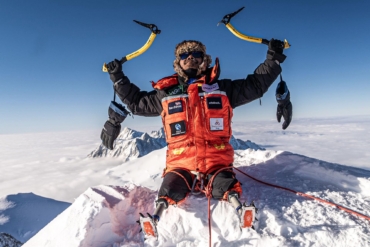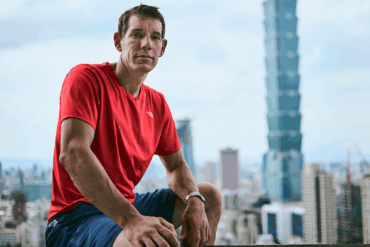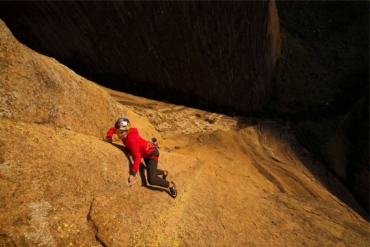[leadin]A near-fatal ski accident in 2011 left Renan Ozturk with shattered vertebrae, a cranial fracture, and the physical and psychological setbacks experienced by injured athletes across the spectrum. Here’s how he got back on the horse.[/leadin]

As a pro climber and filmmaker, Renan Ozturk, 35, of Park City, Utah, plays at a higher level than most. But with high reward comes risk, and in 2011 he was nearly killed in a ski accident in Wyoming.
The incident came just five months before Ozturk and climbers Jimmy Chin and Conrad Anker were to re-attempt the first ascent of Meru. The accident, and climb, are chronicled in the film Meru, released this summer.
What followed in the weeks and months after his ski crash was a clinic in determination, persistence, and the psychology of the driven outdoors athlete. We caught up with Ozturk to look at his approach to heal.
Your method of training could determine how well you adapt
Some athletes are by the book, following regimented training plans. Ozturk eschews this approach, letting his goals and passions drive his training organically. “My training is absolute free-form — I hardly ever go to the gym,” he said. “I climb as much as I can and let that be the force that drives everything.”
Ozturk says his goals aren’t traditional or set in stone — climbing Meru was not the fulfillment of a long-standing desire to make the first ascent, for example. “I have dreams that aren’t that specific,” he said. “Like, I wanted to climb a hard crag in the Himalaya that was a first ascent on a sunny day. And to get to that point, to have the skills necessary to get in that position, you have to wake up every day to get yourself towards it.”

How you get there depends on your style. And your style could determine how you deal with setbacks like injury. Ozturk’s free-flowing method may have helped him adapt when faced with those obstacles.
“I was in disbelief that anything was wrong.”
When Ozturk hooked an edge in the Tetons and fell far enough to crush his skull and vertebrae, his first thought was that he didn’t want to slow down the video production in which he was taking part. “I thought, ‘let’s go,’ but that didn’t last very long before I went unconscious,” he said.
He woke up heavily-drugged, with labored breathing. “Then I had to accept how injured I was and how close a call it was,” he said. “I was pretty pissed at myself for having made that mistake, but at the same time, I learned to accept that mistakes happen and you have to do the best you can to recover.”
In retrospect, injuries always seem stupid – you ignored pain, or committed to a turn you couldn’t make. It’s nice to prevent them, but if – when – they happen, take it as a lesson and do what is in your control to get back to health.
“Lucky for me, I had a timetable to work toward.”
Despite the seriousness of Ozturk’s injury, he was psychologically spurred along by the looming attempt on Meru; in effect, a full and speedy recovery was not a question for him.
“I was dead-set on [climbing Meru],” he said. “Of course, there was a chance I wouldn’t be ready, but I saw there was a glimpse I might be able to do it, and for me, at that point in my life, I was willing to throw down all the cards for it. It was potentially worth dying for.”
“Where there’s a will, there’s a way.”
We don’t necessarily recommend that you plow ahead with your training if your life is at risk, but Ozturk’s determination is easy to admire; moreover, he leveraged his own certainty that he could recover, and made the climb his highest priority, to push himself through months of rehab and therapy in time to suit up with Chin and Anker.
Even if you aren’t willing to die in order to finish that marathon, making it a priority can help you make it happen aside (and in spite of) other life pulls.
It makes you realize how big the mental aspect is,” said Ozturk. “You have to teach yourself to overcome things and do things if you’re passionate enough about them. Sometimes that can trump talent if you’re motivated enough and you love it.”
“If you have that thing that’s really inspiring you, it’s amazing what you can do,” he continued.
Setbacks redefined how rewarding the climb could be
Spoiler alert: just months after the ski accident nearly killed him Ozturk summited Meru with Anker and Chin. He said the obstacles he overcame to get there – including his injury and the trio’s failed attempt in 2008 – made it a defining moment for him.
“I’ve gone through a lot in my life and everything is pointing toward something like that,” Ozturk said. “When you see those high places on the planet and experience those things with friends and partners, that’s what makes you elevate yourself and try harder than you’ve ever tried before. That’s when you realize how far you can go and what you can do.”
Bigger picture: a brush with mortality changed his perspective
Sometimes, an injury is really bad, and you might be left wondering whether your days of [insert your passion here] are over. Desperate, you might compromise, vowing never to take it for granted again, even if you aren’t able to resume the practice at full bore. It’s a lesson that can apply at all levels.
“The [accident] was an unexpected setback,” Ozturk said. “It didn’t occur to me that it could happen until it did.”
“The fact that it can happen to anyone – I wasn’t doing anything particularly reckless while skiing, but something could have happened crossing the street – it reinforces the need to stay aware in life,” he continued. “Things can happen at any moment, so don’t take that for granted.”






